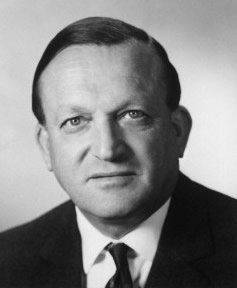Sir Woolf Fisher: Industrial Pioneer and Education Philanthropist
“Today's luxuries are tomorrow's necessities”. This became the slogan of the New Zealand company Sir Woolf Fisher co-founded and later guided to global prominence, Fisher and Paykel. But it wasn’t only refrigerators Fisher had in mind when he used those words. Fisher’s name is recognised as a byword for business excellence, but the man himself may yet be best remembered for his outsize contributions to New Zealand’s educational culture. In either event, his life story is a testament to a common Jewish story in New Zealand of effort and reward.
Woolf Fisher was born in Wellington in 1912, the eldest of six children of Jewish-Russian immigrant, Michael Fisher and Australian born, Fanny Dabscheck. Woolf grew up in Auckland and after a successful period of study at Mt Albert Auckland Grammar, worked as a young salesman. Despite the heavy economic shadows of the Great Depression, he wanted to make a greater commercial mark. In 1934, Woolf, along with his father and together with Maurice Paykel and his father, George, formed the company of Fisher and Paykel. Woolf’s contribution was £40 and a £210 loan on his 1928 De Soto car. A marriage proposal to Maurice’s sister, Joyce Paykel followed and the couple married the following year at Auckland’s Hebrew congregation.
Fisher & Paykel made great strides, showing foresight and adapting quickly to the economic conditions of the day. It expanded into importing washing machines and kelvinator refrigerators until import controls proved prohibitive, prompting the company to begin manufacturing in the late 1930s. During WW2 the company supplied refrigeration to the army and continued to develop innovative methods after the war. As New Zealand’s fortunes shifted in the 1970s, with Britain’s entry into the European Economic Union, Fisher and Paykel moved to develop technology suitable for the local market, earning the company international accolades. Fisher prioritised the well being of his staff, fostering good relationships and ensuring excellent conditions. Later, with Fisher and Paykel’s iconic status already well established, Woolf Fisher became the first chairman of New Zealand Steel.
Fisher was a passionate supporter of education in New Zealand. In 1960, he started the Woolf Fisher Trust to provide funding that maintained the salaries of post-primary schoolteachers and principals while sending them overseas to further their education. The Woolf Fisher Fellowships provide overseas study and travel for outstanding educators. To date, around 1,100 Fellowships have been awarded.
In 1998 a gift from Fisher’s trust allowed the creation of the University of Auckland’s Woolf Fisher Research Centre or Te Pūtahi Whakatairanga Hapori Ako Angitu, which means means 'The centre for the promotion of successful learning communities'.
The Centre is dedicated to the development of education and schooling success for diverse communities within New Zealand, in particular Maori and Pacific Island pupils. The centre has spent more than 15 years developing a model to raise and extend student achievement, working in approximately 400 schools and in 5 countries.
Other awards include the Woolf Fisher Scholarships, enabling New Zealand university graduates to study for three or four years for a doctorate at the University of Cambridge. Each Woolf Fisher Scholarship is worth up to $80,000 per year, making them among the most valuable scholarships of their kind awarded in New Zealand.
These Fellowships and Scholarships seek to encourage in its recipients the qualities which Sir Woolf himself embodied over a long and successful career as an industrial pioneer and leader: integrity, leadership, boldness of vision and exceptional zeal, keenness and capacity for work.
Up until the time of his death, in 1975, Fisher was also a great supporter of the Outward Bound Trust of New Zealand. In 1961 he became its first president and was active on a number of other fronts, most notably the Hebrew Congregation’s trust board. Woolf Fisher was knighted in 1964 for his outstanding contribution to industry and education in New Zealand.


